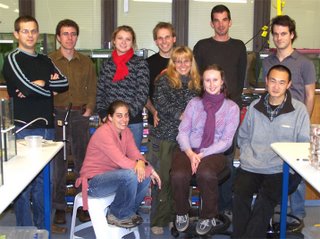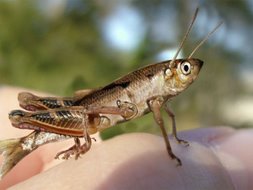Tuesday, November 21, 2006
Thursday, November 16, 2006
Chad Brassil: "Evolution in ecological models: parasitoid behavior to the tropical diversity gradient" (Department talk)
"Evolution in ecological models: parasitoid behavior to the tropical diversity gradient"
1-2pm, Room 456
16/11/2006
Wednesday, October 18, 2006
Quantitative genetics links
I came across this comprehensive set of lectures on quantitative genetics:
Enjoy! Felix
Tuesday, October 17, 2006
Journal club 17/10/06
- N.G. PRASAD and MALLIKARJUN N. SHAKARAD
- Genetic correlations: transient truths of adaptive evolution
- Journal of Genetics 2004 83(1): 4-6.
Wednesday, October 11, 2006
Congratulations on Grant Success
Thursday, September 14, 2006
Wednesday, September 06, 2006
Current Biology: Special Issue on SEX
for everybody who haven't come across it yet:
http://www.current-biology.com/misc/?page=misc5
(Volume 16, Issue 17 , 5 September 2006)
Felix
Wednesday, August 23, 2006
Ageing mailing list
I just came across this mailing list about ageing, it may be worth checking out:
http://www.bio.net/biomail/listinfo/ageing
Have fun with it,
Felix
Wednesday, July 19, 2006
Journal club 19/7/2006
Female fitness declines with increasing female density but not male harassment in the western mosquitofish, Gambusia affinis.
Chad C. Smith and R. Craig Sargent. Animal Behaviour, 71(2), 2006, pp. 401-407.
Tuesday, July 11, 2006
Top five science blogs
"Weblogs written by scientists are relatively rare, but some of them are proving popular. Out of 46.7 million blogs indexed by the Technorati blog search engine, five scientists' sites make it into the top 3,500. Declan Butler asks the winners about the reasons for their success."
See news @ nature.com for the winners
Friday, July 07, 2006
Labmeeting 10/7/2006
Wednesday, July 05, 2006
Journal club
Nancy Tyler Burley, 2006. AN EYE FOR DETAIL: SELECTIVE SEXUAL IMPRINTING IN ZEBRA FINCHES. Evolution 60: 1076–1085
Monday, July 03, 2006
Some bedtime reading
Check out this link to a set of lecture notes written by Bruce Walsh for a post graduate course on evolutionary genetics:
http://nitro.biosci.arizona.edu/workshops/Aarhus2006/notes.html
Wednesday, June 28, 2006
Journal Club
Phillips and Shine, 2006. An invasive species induces rapid adaptive change in a native predator: cane toads and black snakes in Australia. Proc. Roy. Soc. B. 273: 1545-1550
Tuesday, June 27, 2006
And some more...
Impressive new Impact Factors for BioMed Central's open-access journals
Eleven journals published by BioMed Central received their first Impact Factor this month. With nine journals in the top 10 of their 2005 Journal Citation Report category, and ten journals with a 2005 Impact Factor exceeding 3.00, BioMed Central's open access journals are confirmed as publishing high-quality, highly cited research.
Many journals in the BMC series also received their first Impact Factors this year. BMC Developmental Biology, with an Impact Factor of 5.41, is ranked at number six in the developmental biology field. BMC Structural Biology enters the Biophysics category at number eight, with an Impact Factor of 5.00. BMC Evolutionary Biology, with an Impact Factor of 4.45, is the 6th most highly cited journal in the Evolutionary Biology category. BMC Biotechnology (3.05), BMC Neuroscience (2.73), BMC Microbiology (2.18) and BMC Gastroenterology (1.46) also received their first Impact Factor.
Read more on the BioMed Central website
Thursday, June 22, 2006
Additional info about open access journals
Citation Advantage of Open Access Articles.
Gunther Eysenbach.
PLOS, 4(5), 2006, pp. 692-698.
Open-access journal hits rocky times
Read more on the Nature website
Thursday, June 08, 2006
The 3rd International Conference of Quantitative Genetics
Preliminary Announcement
The 3rd International Conference of Quantitative Genetics
Zheijiang University, Hangzhou, China August 18-24, 2007
The 3rd International Conference on Quantitative Genetics (ICQG)
will be held during August 18-24, 2007 at Zhejiang University in
Hangzhou, China. As with the 1st ICQG in Ames, Iowa in 1976 and
the 2nd ICQG in Raleigh, North Carolina in 1987, the 3rd
Conference will be a comprehensive survey of the current status
of quantitative genetics. New technologies in areas ranging from
genomics and molecular genetics to statistics are providing both
opportunities and challenges for our understanding of the genetic
basis of quantitative traits in natural populations, the
evolution of characters, and use for plant and animal
breeding. Program suggestions will be welcomed by the Conference
Organizers listed below.
Zhejiang University is one of the few top-rank research
institutions in China. It is a comprehensive institute with a
full range of disciplines. With a faculty capable of top-level
and large-scale research and a high proportion of graduate
students, the university has been undertaking projects, both
basic and applied, to address pressing issues and challenges of
today and of the future.
The City of Hangzhou is one of the seven ancient capital cities
of China. It has a population of 3.72 million and has a recorded
history spanning 2100 years. Marco Polo described Hangzhou as the
"Most beautiful, magnificent, and heavenly city in the world."
Located in China's most developed southeast coastal area,
Hangzhou is renowned for its thriving economy, colorful culture
and beautiful landscape, especially its famed West Lake and Tea
House.
Academic Chairs: Bruce Weir (bsweir@u.washington.edu) and Bill Hill
(w.g.hill@ed.ac.uk)
Academic Co-chairs: Junyi Gai (sri@njau.edu.cn) and Changquin Wu
(chxwu@public.bta.net.cn)
Conference Organizers: Jun Zhu (jzhu@zju.edu.cn) and Zhao-Bang Zeng
(zeng@stat.ncsu.edu)
Tuesday, June 06, 2006
Journal Club 21 June - Different Model (requires preparation)
For the 21st, I want each of us to find one paper and spend 2-3 minutes speaking about that paper and it's merits. To keep things a bit focussed, I suggest we limit ourselves to papers from open-access journals (PLoS Biology, BMC titles, etc). This will give us a chance to find out about some of these interesting journals and their publishing model at the same time as learning about the science. Please send me your paper's title ahead of time so I can be sure there won't be duplication.
Rob
PS. Think and let Simon, Erik and I know (or post on this blog) what you think about this model. We can use it in future to target particular journals, fields, taxa or time periods in the history of Evolutionary Biology.
Friday, June 02, 2006
Journal club 7/6/6
Evolution: Do Bad Husbands Make Good Fathers?
David H. Hosken and Tom Tregenza.
Current Biology, 15(20), 2005, pp. 836-838.
(Short review)
Assessing putative interlocus sexual conflict in Drosophila melanogaster using
experimental evolution.
Andrew D. Stewart, Edward H. Morrow and William R. Rice.
Proc. R. Soc. B., 272, 2005, pp. 2029-2035.
Thursday, May 25, 2006
Journal club 31/5/6
Adaptive genetic complementarity in mate choice coexists with selection
for elaborate sexual traits.
Kevin P. Oh and Alexander V. Badyaev.
Proc. R. Soc. B., FirstCite early online publishing, 2006, pp. 1127-1130.
Monday, May 22, 2006
Journal club 24/5/06
Learned kin recognition cues in a social bird.
Stuart P. Sharp, Andrew McGowan, Matthew J. Wood & Ben J. Hatchwell.
Nature, 434, 2005, pp. 1127-1130.
Friday, May 19, 2006
SCIENCE - Aging
For those of you interested in aging, SCIENCE magazine has created the
Science of Aging Knowledge Environment - and because everything has an
acronym this is called SAGE KE. Check out this rather useful website on the
science of aging at http://sageke.sciencemag.org/.
Rob
Thursday, May 18, 2006
Journal club 17/5/06
Sex, death and tragedy.
Daniel J. Rankin and Hanna Kokko.
TREE, 21(5), 2006, pp. 225-226.
(commentary on the following paper)
Sex ratio bias, male aggression, and population
collapse in lizards.
Jean-Francois Le Galliard, Patrick S. Fitze, Regis Ferriere and Jean Clobert.
PNAS, 102(50), 2005, pp. 18231-18236.
Monday, May 15, 2006
Notice bored
Any ideas? Anyone who wants to spend some time and energy making it work?
*http://www.bees.unsw.edu.au/school/staff/brooks/brookspubs.html
...............................................................................................
School of Biological, Earth and Environmental Sciences
The University of New South Wales
Kensington, Sydney 2052
NSW, Australia
PH: +61-2-9385-2587 FAX: +61-2-9385-1558
http://www.bees.unsw.edu.au/school/staff/brooks/brooksrob.html
Australasian Evolution Society: http://www.evolutionau.org
Wednesday, May 10, 2006
Monday, May 08, 2006
Meta-Analysis (lab meeting/Simon)
Mentioned Articles on meta-analyses:
Mentioned program:
::Felix Zajitschek
::BEES / 2052 UNSW / NSW / AUSTRALIA
Friday, May 05, 2006
Group Setup & Info
Posts under the name of EvoEcoSex come from members of the Brooks and the Griffith lab at the School of Biological, Earth and Environmental Sciences, in short BEES, at the University of New South Wales (UNSW) in Sydney.
Both lab groups work on similar questions, relating to behavioural and evolutionary ecology of sexual reproduction and life histories. We use quantitative genetic analyses, behavioural observations and manipulative experiments to test hypotheses generated from sexual selection and life history theory. We are also interested in the biology of ageing, the evolution of sexual dimorphism, sex determination, genomic imprinting and of the Y chromosome, and the evolutionary consequences of inbreeding.
You can find us here:
- Griffith lab: links under 'Avian Behavioural Ecology' on http://www.bees.unsw.edu.au/research/researchgroups.html
Brooks Lab United (June 2006)
(click on picture to enlarge)

Back row, from left:
Rob Brooks, Russell Bonduriansky, Tessa Crozier, Felix Zajitschek, Erik Postma, Matt Hall.
Front row, from left:
Nicolle Spyrou, Susi Zajitschek, Kate Carroll, Nori Kawasaki.

